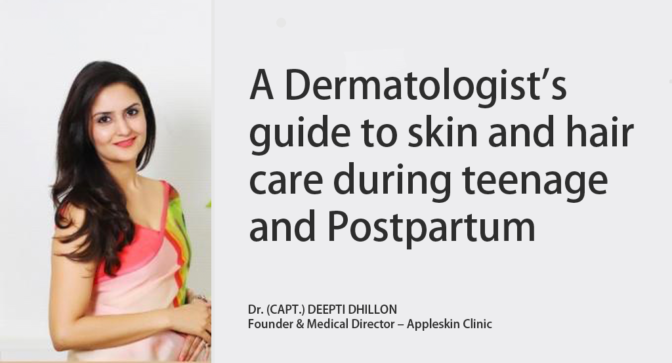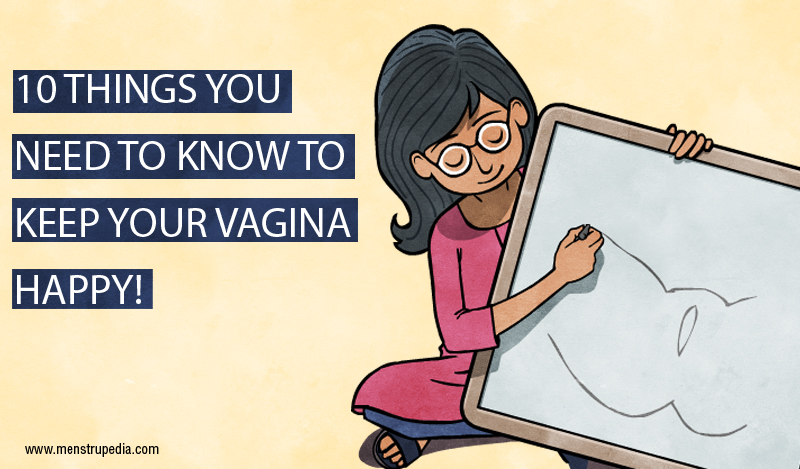This article is based on the IGTV live discussion with Dr. Dipti Dhillon, a renowned cosmetic dermatologist. It discusses the correct time to get checked up for changes in skin and hair along with tips for a healthy lifestyle and hormonal changes in the body post-pregnancy which affectsboth skin and hair.
When is the correct time to visit a skin/haircare expert?
Parents should keep an eye on their children’s acne, pigmentation, facial hair, and the texture of hair as these could be indicators of severe internal problems such as insulin resistance, PCOS or even thyroid. It is also important to understand the causes of acne on children’s skin. Acne on the forehead is caused by eating a lot of junk food which contains GMO, whereas acne on the jawline erupts due to hormonal changes.
Children can be brought to the clinic for a routinely visit from as early as 10 years of age. Dermatologists enforce skin hygiene, suggest skin cleansers and treatments on the basis of habits like involvement in sports. Sunscreen usage and chemical peels should be a regular part of children’s lifestyle and acne should be treated at the earliest as it leaves stubborn marks on the skin which are only visible after a person ages and loses skin elasticity.
Earlier intervention leads to hormonal investigation and diagnosing several conditions. Black patches on the insides of thighs, armpits, on the back of neck and on knuckles can be a symptom of acanthosis nigricans. This is a skin condition which can be a sign of cancerous tumours in internal organs.
All this can be identified by the dermatologist at an early stage with the keen observation of parents. Being on the lookout for coarse hair, excessive premature hair fall, facial hair, and black patches can help in preventing major disorders. Dermatologists can also counsel children about their worries regarding blackheads, whiteheads and complexes they might feel while comparing their hair and skin with their peers.

Habits that teenagers can form for a better lifestyle
PCOS, intense PMS and other hormonal disorders are also affected by lifestyle habits. One can follow the tips mentioned below from pre-teen years (10 years onwards) towards leading a clean and healthy lifestyle:
- Maintain good sleep hygiene. Sleep for at least 8-10 hours a night.
- Match your circadian rhythm with the daylight. Sleep at a particular time at night and wake up at a particular time daily. 7am to 8am at the most is a good time to wake upup.
- Take a walk in the sunlight to de-stress yourself in the morning.
- Maintain a regular exercise regime to increase the release of endorphins (helps in releasing stress).
- Yoga, aerobics and light exercises like pilates are good practice during the PMS phase.
- Regulate a healthy weight, in which your body feels agile and comfortable. A healthy weight reduces androgen production which causes facial hair and acne. People with PCOS who reduce 5-10% of their excess body weight feel a difference in their PCOS symptoms.
- Eat a healthy breakfast which is protein-rich (for growth and immunity strengthening), one that has less fats and a moderate amount of carbohydrates. Breakfast should never be skipped as it regulates hormones in the body and manages cortisol (which affects metabolism, blood sugar level and stress).
- Reduce phthalates (present in pesticides) and PPA consumption (storing water in plastic bottles and consuming it the whole day).
- Avoid refined sugars (in cookies, pastries, chocolates, pizza bases, etc.) and GMO (present in junk food).
- Parents and pre-teens should observe acne patterns (on the jawline or forehead) and immediately consult a doctor if they feel that something is amiss during periods.
- Track your menstrual cycle and changes and get evaluated if you feel a lot of pain.
- The vagina is a naturally cleansing area and therefore, soap should not be used to clean it. Dryness and dermatitis will follow if you do so.
- Use lukewarm water or intimate washes with a pH value of 3.8 to clean your vagina (the vaginal environment is acidic and therefore an acidic pH is suitable). Glyceric acid and lactobacillus are other components you can look for in your intimate washes.
- Pigmentation in the vaginal area could be due to insulin levels. Do not scrub the area excessively to reduce pigmentation. Consult a dermatologist or gynaecologist if pigmentation becomes suspicious.
- After shaving or waxing, you might find pimples on your skin. Often, it is a smaller root of a hair that curls up and gets covered by the skin which is called an ingrowth. Ingrowths can get infected and it is advisable to get it reduced by laser hair reduction therapy.
- Include supplements in your diet. Ashwagandha and tulsi (a good anti-inflammatory herb) can be added in green teas and consumed. Check for iron deficiency and add zinc, selenium and other vitamins in your diet through supplements.
- Practice seed cycling which regulates hormones and reduces PCOS symptoms. For the first 15 days of the cycle, have flaxseed seeds and switch to pumpkin seeds in the next 15 days.
- If you get painful cramps, then include coconut water, zinc, and magnesium in your daily diet.
- Get your skin cleaned regularly using chemical peels and oil reduction treatments in order to treat acne. Use salicylic acid-based cleansers.
- Untreated acne can evolve into irritable scars which would require more efforts to remove.Therefore, get yourself checked if too many pimples crop up. This is an indicator of a hormonal or lifestyle imbalance.
Post-childbirth haircare and nutrition
We have often heard about pregnancy glows and it almost feels as if nature is taking care of pregnant people, showering them with radiance and bliss. There is a scientific mechanism behind it because during pregnancy,estrogen levels are at their peak at all times. The skin feels nice, there is collagen boosting, hydration, and oil is balanced. The scalp is healthy and hair becomes thicker and smooth. People also take good care of themselves and eat well and sleep well during this time. There is also a motivation to be stress-free and that adds up to the glow.
Immediately after pregnancy, hormonal levels drop significantly. The face becomes blotchy, the scalp becomes dry and hair starts falling out as there is an iron deficiency. These changes are to expected and normal, and it takes about 2-3 months for the body to balance the levels of estrogen and progesterone post-pregnancy. If the dryness, sensitivity and hair fall continue after 3 months, then it can be due to other factors as well.
DOs
- Take supplements like saw-palmetto to control acne.
- Take biotin and zinc (50 mg per day for 8 weeks or recommended dosage by doctor) for a healthy scalp.
- Include probiotic intake to reduce inflammation and swelling in the body.
- Start seed cycling to balance hormones (flaxseed for 15 days and pumpkin seeds for the next 15 days).
- Use silk pillows if the hair feels dry.
- Use wide tooth combs to brush your hair. It evenly spreads natural oils at hair roots.
- Visit a doctor to investigate hormonal levels and for them to provide serums, medicines for iron deficiency or to suggest therapies such as stem cell and PRP to halt the process of hair fall and improve the process of natural hair growth.
It is important to take the call early so that you can prevent major issues and take better care.
Edited by Divya Rosaline







